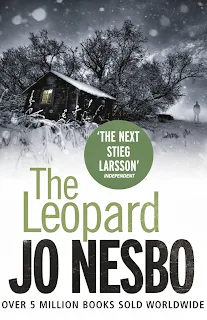“The Leopard” by Jo Nesbo – Meeting Madness
Jo Nesbo’s The Leopard is another novel in the Harry Hole series, this time focusing on our beloved protagonist as he tries to escape the demons from his past by retreating to Hong Kong, otherwise known as “as far away as possible”.
However, things don’t go Hole’s way as Oslo is need of him once again; a new and rather deranged psychopath killed two young women, drowning them in their own blood.
As Hole finally manages to make his way back to his town, the killer strikes once again, thrusting Hole knee-deep into a challenging investigation, one that will take pit him against a new face of evil.
Despite there being virtually no leads, Hole doesn’t let up his efforts and trudges on forward to meet his new adversary, who despite being quite insane, is undoubtedly very cunning, intelligent, and self-aware. As has become the habit with Hole novels, Nesbo adopts a breakneck pace, throwing twists and turn at us faster than we can let them sink in.
By the middle of it, you actually stop thinking that you know what is going to happen next, and start experiencing the novel by “living” through the story, as Hole himself would from his own perspective. Needless to say, this makes the whole ordeal that much more exciting and unpredictable.
As some readers have noted, Nesbo has displayed a tendency as moving towards more explicit naturalism, in the sense that Hole’s adventures are becoming more and more violent as well as detailed in those regards.
This tendency has been maintained here, and it feels like Nesbo spent a bit too much time focusing on the murder tools and creating shocking death scenes rather than the story itself.
Nevertheless, you must understand that I am comparing Nesbo to none other than himself, meaning these remarks are in comparison to what is observed in his other stories.
The story is by no means weak or neglected around here, it’s just that the violence and sensationalism take on a bigger role than before. The plot is still very nuanced and does require some brainwork from the reader in order to be completely understood and appreciated.
Harry Hole himself is once again explored in great depth, as Nesbo takes us deep into his broken and fragmented mind, making us feel his suffering like only a true virtuoso could.
At some point, you have the impression that Hole is turning into a real person, one who you know and understand much better than many people in your life who actually exist.
All in all, even though The Leopard isn’t on par with the quality of earlier Hole novels, it still remains a very powerful and captivating addition to the series, one his fans shouldn't pass up on, as well as anyone looking for a detective story with a very gritty element to it.
However, things don’t go Hole’s way as Oslo is need of him once again; a new and rather deranged psychopath killed two young women, drowning them in their own blood.
As Hole finally manages to make his way back to his town, the killer strikes once again, thrusting Hole knee-deep into a challenging investigation, one that will take pit him against a new face of evil.
Despite there being virtually no leads, Hole doesn’t let up his efforts and trudges on forward to meet his new adversary, who despite being quite insane, is undoubtedly very cunning, intelligent, and self-aware. As has become the habit with Hole novels, Nesbo adopts a breakneck pace, throwing twists and turn at us faster than we can let them sink in.
By the middle of it, you actually stop thinking that you know what is going to happen next, and start experiencing the novel by “living” through the story, as Hole himself would from his own perspective. Needless to say, this makes the whole ordeal that much more exciting and unpredictable.
As some readers have noted, Nesbo has displayed a tendency as moving towards more explicit naturalism, in the sense that Hole’s adventures are becoming more and more violent as well as detailed in those regards.
This tendency has been maintained here, and it feels like Nesbo spent a bit too much time focusing on the murder tools and creating shocking death scenes rather than the story itself.
Nevertheless, you must understand that I am comparing Nesbo to none other than himself, meaning these remarks are in comparison to what is observed in his other stories.
The story is by no means weak or neglected around here, it’s just that the violence and sensationalism take on a bigger role than before. The plot is still very nuanced and does require some brainwork from the reader in order to be completely understood and appreciated.
Harry Hole himself is once again explored in great depth, as Nesbo takes us deep into his broken and fragmented mind, making us feel his suffering like only a true virtuoso could.
At some point, you have the impression that Hole is turning into a real person, one who you know and understand much better than many people in your life who actually exist.
All in all, even though The Leopard isn’t on par with the quality of earlier Hole novels, it still remains a very powerful and captivating addition to the series, one his fans shouldn't pass up on, as well as anyone looking for a detective story with a very gritty element to it.
 | Jo NesboPersonal site Jo Nesbo is a Norwegian musician and book writer who has gained a solid foothold in his native country, selling more than 1.5 million copies of his novels in Norway (9 million worldwide) and having them translated in more than 40 languages. One of his more famous books is The Headhunters, on which a very successful 2011 film was based. |








Comments
Post a Comment